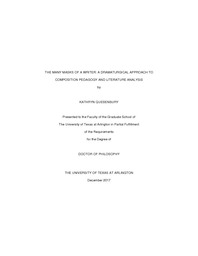| dc.description.abstract | Audience theories discuss many aspects of the entity of audience, from specific, concrete individuals to general, abstract readers. Composition pedagogical approaches to audience, however, seem limited. Writers, at times, are directed to have a concrete reader in mind, and other times, writers hold certain expectations for those readers and provide textual clues for them to follow. Which approach to take varies on the situation, but teaching writers this type of discernment can be challenging. Erving Goffman provides a possible solution in The Presentation of Self in Everyday Life.Goffman analyzes how individuals portray themselves differently depending on the social situation, and he compares this behavior to actors performing on a stage, thus employing the term dramaturgy. Goffman's dramaturgical theory can be utilized in both composition pedagogy and literature analysis since writers, too, present themselves differently depending on the social situation. Using a dramaturgical approach can be especially effective in analyzing autobiographical texts. For example, Frederick Douglass' three autobiographies demonstrate the reinvention of self over a lifetime. Even though each edition is Douglass' autobiography, he carefully chooses what and how to present based on his audience and the most efficacious approach of convincing them of his new message. Indeed, writers need such methods for affecting their audience as seen with Indian boarding school students crafting "idealized selves" in order to influence white readers. an audience very different from themselves. By recognizing strategies employed by other writers, students can, then, apply similar techniques to their own writing. Through a dramaturgical approach to composition, students focus their coursework on their prospective career fields and recruit two professionals in that field to review their essays. The overall premise of this approach is for students to gain a broader perspective of audience than solely that of the English teacher and to develop impression management skills that will serve them regardless of audience, but especially for an audience of their future discourse communities. This study, specifically focused composition theory, analyzes students' reactions to this type of approach and relates their reactions to the Eight Habits of Mind as outlined in "Framework for Success in Post-secondary Writing," composed by the Council of Writing Program Administrators, the National Council of Teachers of English, and the National Writing Project. | |


